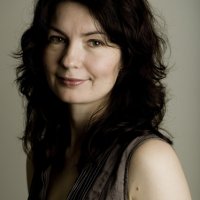Kirsten Tranter

Kirsten Tranter grew up in Sydney and now lives in the San Francisco Bay Area. She is the author of three novels, including Hold (2016), longlisted for the Miles Franklin Award. Her first novel, The Legacy, was praised by The Guardian as ‘a seductive contemporary literary thriller… a knowing, classy debut’ and was a Kirkus Review début novel of the year; it was shortlisted for the ALS Gold Medal and the ABIA literary fiction award, and longlisted for the Miles Franklin award. Kirsten completed a PhD in English Literature at Rutgers University in 2008, and publishes essays, journalism, and literary criticism. She is a founder of the Stella Prize for Australian women’s writing.
Dominated by tropes of repetition, inversion, and doubling, Parade feels like a hall of mirrors that reflects and re-imagines pieces of reality while also refracting elements of Rachel Cusk’s own body of work. This is not recognisably a novel or a collection of short fiction, but a new iteration of the style initiated by Cusk’s lauded Outline trilogy (2014), a patchwork of vignettes unfolded b ... (read more)
Grief and love in America are the subjects of Lorrie Moore’s new novel, which is part surreal road trip, part love story, and partly made of letters from a woman to her late sibling. Finn, a school teacher suspended for some of his unorthodox ideas about history, attends the bedside of his dying brother, Max, but is then drawn away by his fatal attraction to a suicidal ex-lover, Lily, right arou ... (read more)
The Tasmanian childhood recounted by Heather Rose sounds idyllic, to the point of being suspect, a too-perfect vision of wholesome family life. ‘We do not own a television. Books and games, music and friends, the radio and the outdoors are our entertainment,’ she writes. In this paradise of neighbourly trust, ‘no-one locks their doors. We are welcome in everyone’s houses.’ Rose remembers ... (read more)
It is day one hundred and seventeen of the official ‘Shelter in Place’ order in Berkeley, California, when I finish Susanna Clarke’s surreal, heartbreaking novel Piranesi, having rationed the final pages over several days.
There is something about lockdown and its strange effects on the mind that makes every text seem like a code for the situation of quarantine, every story an allegory of c ... (read more)
For anyone feeling stir-crazy after weeks cooped up in self-isolation, A Theatre for Dreamers offers an appealing escape, a virtual vacation on the Greek island of Hydra. Dive into these pages and you can swim vicariously in a perfect horseshoe-shaped bay, dry off in the summer sun, admire countless young, scantily clad men and women, and end the day with a glass of retsina while you watch the moo ... (read more)
Dervla McTiernan’s third novel consolidates her standing as a star of Irish detective fiction, following her breakout début, The Rúin (2018), and its follow-up, The Scholar (2019), all featuring Detective Sergeant Cormac Reilly.
Dublin dominates the imagination of Irish crime writing, but McTiernan’s stories centre around the western city of Galway and the small towns that surround it, plac ... (read more)
Kudos concludes the extraordinary trilogy that began with Outline (2014) and Transit (2016). Following the distinctive format of the first two books, Kudos is structured by a series of conversations between the narrator (a writer named Faye, who seems to be a barely disguised version of Cusk) and various interlocutors, in which the narrator herself speaks barely at all. As before, there is nothing ... (read more)
The setting is a gorgeous, somewhat decayed, many-roomed Georgian mansion in upstate New York, near the Hudson, in 2012. Nine screens placed around a darkened gallery space each show a room of the house, most of them occupied by a person and a musical instrument: a willowy woman in a slip on a chaise longue, arms wrapped around a cello; a dark-skinned man seated at an ornate desk leaning intently ... (read more)
